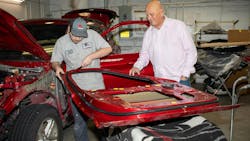Procrastination is one of the great self-inflicted stressors that almost everyone has faced at least once in their life.
Whether it’s waiting until the hour before a paper for a college class is due to start writing it or waiting until that ache in your tooth hurts just a little too much before you call the dentist, for some reason or another, it doesn’t seem worth it to do the simple task until it’s almost too late.
Dave Dunn is the owner of Dave’s Auto Body in Galesburg, Illinois, and is a principal instructor at the Masters School, which specializes in collision repair management education. He says far too often, he’s seen shops take the procrastinator’s approach when it comes to recruiting and hiring talent, which leads them to making poor hiring decisions.
“When you wait until you have an immediate need, you panic,” Dunn says. “You’re reactive, and when you do that, you're a little more desperate and so you don’t scrutinize the hire at the same level as you should.
A report from the American Psychological Association states that around 20 percent of all Americans are chronic procrastinators, and a main factor for most of those people comes from decision-making anxiety – it’s easier to wait until you’re forced to make a decision than to be proactive.
Dunn says with just a little forethought and regular planning, you can turn the anxiety of finding new talent into a robust talent pipeline.
“It’s simple,” he says. “You're just going to make a better decision if you think about recruiting and hiring well in advance of when you might actually need somebody.”
A Little Time, a Big Reward
Dunn has run Dave’s Auto Body for nearly 50 years, and though it’s been tweaked slightly through the decades, his approach to recruiting has stayed relatively the same.
“Dave is the master at recruiting and hiring,” says Gerry Enders, owner of Arcadia Body Shop in Arcadia, California. “His approach to solving the personnel puzzle and how everything ties together should be a course everyone takes.”
The approach is simple: Always be recruiting.
Dunn keeps an active database that he calls his active potential employee roster. Anyone who shows interest in working for his shop, whether that be someone who fills out an application or someone who reaches out to Dunn personally to ask about work, is put on the list.
It’s not a list used for active communication – it’s simply there so that when a job does come open at his shop, Dunn can reach out to an engaged pool of curated candidates.
“Simply, we have a waiting line,” Dunn says. “It's not likely that we would get back to someone very soon, but at the same time, if they’re on our active potential employee roster, we offer them an opportunity to apply for a job as soon as it comes open.”
The potential employee roster will have around 100 names on it at any given time. Every three months, Dunn says he puts some time on his calendar to review the names and keep them up to date.
On that list, there are about 50 or so who Dunn says are “pretty legitimate” candidates. Of those, there are a select few that he has a high interest in. For those folks, he’ll send a text or give them a quick call just to check in and remind the candidate that even though he may not have a job for them just yet, he’s still interested in staying in touch. For the other 50 that are lower on the list, they stay on the list for a while until Dunn hears that they’re not interested or until the list becomes “antiquated,” which is when he’ll delete a few names.
Dunn is always looking for new people to add to the list, so he keeps recruiting cards with him to hand out to anyone who might be interested, or who he might be interested in having work at his shop. Oftentimes, those people do not work in the automotive repair industry.
“The recruiting card basically says, ‘I couldn't help but notice your winning attitude, and Dave’s Auto Body is always looking for good talent to be part of our active potential employee roster,’” Dunn says. “We hire character and we teach skills, so if I see somebody repeatedly having great behavior and attitude, I’m going to recruit that person.”
To keep track of the names on the list, Dunn uses customer information management software, but he says that a physical list kept in your desk drawer can be just as effective.
Though that may all seem like a lot of work, Dunn says once your list is established, it shouldn’t take much more than 30 minutes every three months to reach out to the few high-interest candidates and remove names that don’t need to be on the list anymore.
“Think about how much work you put in when you need someone and you’re in desperation mode, building an ad and throwing it out on Indeed or Jobs.com and then you just sit there and wait,” Dunn says. “Thirty minutes every three months is not a lot to invest in your future, and it’s a far better use of your resources.”
Recruit from Within
Enders says one of the main things he’s learned from Dunn is not only do you have to actively recruit potential employees; you also need to actively recruit your own.
“If you look at the people you have that have progressed in your organization, it's usually because you were willing to teach them not only the ‘how’ to do a task but also the ‘why’ we are doing it this way,” Enders says. “Teaching the bigger picture is going to make your shop a place where people feel secure and like they have a future. Once you start recruiting your own staff on a daily basis, word gets out, which in turn will recruit the right people when the need arises.”
Dunn says good culture and valuing your own employees is the key to a strong recruiting pitch. Making sure that your current employees feel taken care of financially and safety-wise will help them be more able to focus on putting in good work, day in and day out.
Simply put, if you have talented employees who feel valued, you won’t have to fill as many open roles because people won’t leave. And when you treat your employees well, word spreads, and that means more people will want to work for your shop.
“We get to know people well ahead of time during our recruiting and training processes,” Dunn says. “We get a chance to establish the value of our workplace, and they get a chance to see that they’re not just the bottom line of a check. It’s a more relational approach and not such a transactional approach.”
But does Dunn’s simple method really work? The proof is in the people. Dunn says his shop’s employees currently average 12 years of service on the team, with several who have been with him for almost 40 years.
“We've been practicing this recruitment philosophy for so many decades now that it's second nature to us,” Dunn says. “We're never caught short.”
About the Author

Noah Brown
Noah Brown is a freelance writer and former senior digital editor for 10 Missions Media, where he facilitated multimedia production several of the company's publications.
